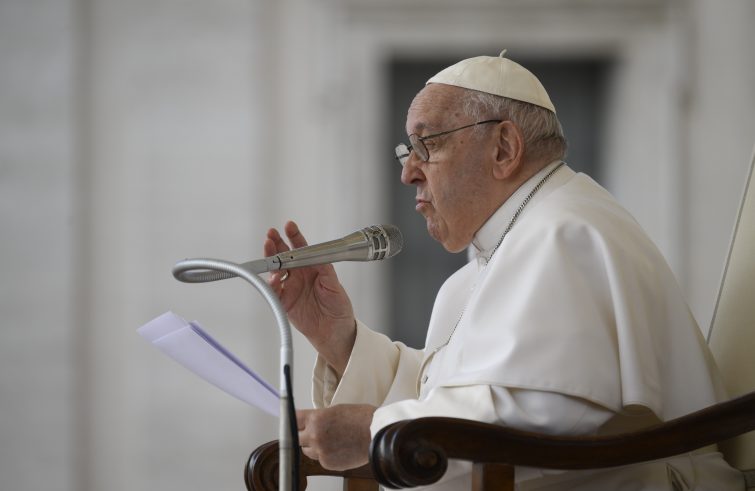
“Let us pray to the Lord for the martyred Ukraine, where there is so much suffering!” Pope Francis said in his appeal delivered at the end of today’s General Audience, in his greetings to the Italian-speaking faithful. “Let us pray for the wounded, for the children, for those who have died, that there may be peace”, Francis continued, having mentioned Ukraine also moments earlier, in his greetings to the Polish faithful and entrusting to the Lord “all the troubled matters of your homeland and those of other countries, notably the question of peace in Ukraine.” The figure of St Francis Xavier, “the greatest missionary of modern times”, who became the patron saint of Catholic missions, was at the heart of the catechesis.
“There are many, many priests, lay people, women religious who go to the missions…even from Italy”,
The Pope said in the opening remarks during today’s general audience, enriched with many unscripted comments. “There are many women and men in history who have done this in an exemplary way, so many hidden missionaries”, Francis said with regard to apostolic zeal. “This is incredible – to leave your own country to preach the Gospel”, ha commented: “this is apostolic zeal. This is what we really need to cultivate.” Saint Francis Xavier, the Pope recalled, was born into a noble but impoverished family in Navarre, northern Spain, in 1506. He went to study in Paris with a view to being appointed to a well remunerated ecclesiastical position that would secure his future: “He was a nice and bright young man, who excelled in sports and studies. In his college he met an older and somewhat special companion,” St. Ignatius of Loyola.”. “He was the first of a numerous band of passionate missionaries to depart, ardent missionaries of modern times, ready to endure immense hardships and dangers, to reach lands and meet peoples from completely unknown cultures and languages, driven only by the powerful desire to make Jesus Christ and his Gospel known”, the Pope pointed out.
“In just under eleven years, he accomplished an extraordinary task”,
Francis said with regard to Saint Francis Xavier’s activities in India.
“Journeys at that time were harsh and perilous. Many people died enroute, due to shipwrecks or disease. Today unfortunately, they die because they let them die in the Mediterranean.”.
Francis Xavier spent more than three and a half years on ships, a third of the entire duration of his mission, the Pope said:
“What courage these holy missionaries had! And today’s missionaries too”,
Francis’ homage. Furthermore, Saint Francis Xavier, “translated the catechism into their local language and taught them how to sing the catechism,” the Pope added quoting a passage from his letters, in which he describes his feelings: “Dangers and sufferings, accepted voluntarily and solely for the love and service of God our Lord, are treasures rich in tremendous spiritual consolations. Here, in a few years, someone could lose their eyes from so many tears of joy”.
“Even today, China is a cultural centre with a vast history, a beautiful history…”,
Francis said speaking of Saint Francis Xavier, “a great dreamer”, and his dream to travel to China. “He was filled with the apostolic zeal to go beyond”, he explained: “in Japan, he understood that the decisive country for his mission in Asia was another: China. With its culture, its history, its size, it exercised de facto dominance over that part of the world.” “So, he returned to Goa, and shortly afterwards embarked again, hoping to enter China,” Francis remarked: “But his plan failed – he died at the gates of China, on an island, the small island of Sancian, in front of the Chinese shoreline, waiting in vain to land on the mainland near Canton. On 3 December 1552, he died in total abandonment, with only a Chinese man standing beside to watch over him. Thus ended the earthly journey of Francis Xavier.” “Francis died, at only forty-six years of age, he had spent his life zealously in the missions”, the Pope added off text: “He left Spain, a highly developed country, and died at the threshold of great China, accompanied by a Chinese man. It is highly symbolic, highly symbolic.”
Saint Francis Xavier “specifically went to the ‘frontiers’ when it came to care. And there, he grew in greatness.”
In essence, “the love of Christ was the strength that drove him to the furthest frontiers, with constant toil and danger, overcoming setbacks, disappointments and discouragement; indeed, giving him consolation and joy in following and serving Him to the end”, the Pope said, and concluded his catechesis on a hopeful note: “May he give us a little bit of this zeal, of this zeal to live for the Gospel, to proclaim the Gospel.
So many young people today have something…a restlessness…and they do not know what to do with that restlessness. Look to Francis Xavier, look at the horizons of the world, look at the people who are in such need, look at how many people are suffering, so many people who need Jesus.










